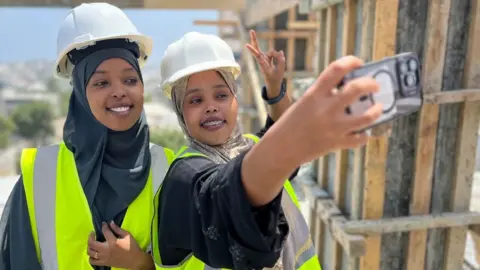### The Rise of Women in Somalia’s Construction Boom
In recent times, Mogadishu, the capital of Somalia, has experienced a resurgence in construction activities, providing unprecedented opportunities for women in the field of engineering and construction. Among the prominent figures in this transformation are two young female engineers, Fathi Mohamed Abdi and Saadia Ahmed Omar. They have taken on significant roles overseeing a remarkable construction project—a 10-floor apartment complex located in the Hodan District of the city, representing a new chapter for women in a traditionally male-dominated field.
Wearing their hard hats and navigating through construction sites, the duo leads teams predominantly made up of male workers. Abdi, who is the chief operating officer of Arkan Engineering Services—a Somali-owned construction company—has faced skepticism. “When I started, people doubted me,” the 24-year-old remarked. There were questions about having a woman manage such significant commitments, especially regarding trust in engineering and property investment. Despite these hurdles, both Abdi and Omar have spent the past five years honing their skills as practicing engineers.
The backdrop of their professional journey is starkly contrasted by the tumultuous history of Somalia. The nation, which suffered a destructive civil war starting in 1991, has left lasting effects on its structure and society. Abdi recalls the chaos of her childhood and how partners in project development now recognize the essential role women play in the city’s reconstruction efforts. “Mogadishu needs us,” asserts Omar, echoing a sentiment of hopefulness amidst their harsh realities.
Although centuries of war have left visible scars on the city, such as bombed-out buildings in neighborhoods like Shangani, a rapid wave of new developments is becoming evident. Cranes now punctuate the skyline, symbolizing the ambitious transformations in urban infrastructure. Yet, both women are acutely aware that the demand for skilled professionals, such as engineers, is rising, and it is this labor shortage that has opened doors for them.
The chairman of the Somali Engineers Association, Ibrahim Abdi Heyle, confirms the push for women’s involvement in engineering stemmed largely from this demand. He stated that the increase in various infrastructure projects has led to an emphasis on women stepping into roles that were previously dominated by men. His association not only encourages but advocates for women to engage in engineering, recognizing them as vital assets in filling workforce shortages.
Mogadishu’s construction landscape has evolved tremendously, with reports indicating that over 6,000 buildings have been constructed in the past five years. This prolific growth has been fueled by improved security conditions and diaspora investments, as many Somali expats are pouring resources back into their homeland. Notably, remittances accounted for approximately 16.7% of Somalia’s GDP in 2022, creating a fertile ground for architects and engineers.
The transition to a thriving urban environment is not without its challenges. Safety remains a crucial concern as construction practices sometimes fail to adhere to basic structural integrity guidelines. Veteran architect Siidow Cabdulle Boolaay expresses fears over the loss of Mogadishu’s historical character and highlights concerns regarding the materials used in construction. The prevalence of salty sand in building practices risks long-term structural reliability.
Despite the optimistic narrative of a burgeoning urban landscape, Abdi and Omar have encountered significant barriers, with only 5% of engineers being women. Their experiences while seeking internships reflect systemic gender biases, with many companies skeptical of women’s capabilities in physically demanding roles. Nevertheless, both women have risen to the occasion, successfully overseeing multimillion-dollar construction projects and changing perceptions.
As they continue to shape Mogadishu into a modern urban center, both engineers exemplify resilience and the transformative potential of women in workforce development. “The city is now home to taller buildings and modern infrastructure,” beams Abdi, acknowledging the pride in their work not just as construction professionals but as pioneers for future generations of women in engineering. With continued efforts and advocacy, they are proving that women can lead projects, influence change, and inspire communal hope for a better, more resilient Somalia.



